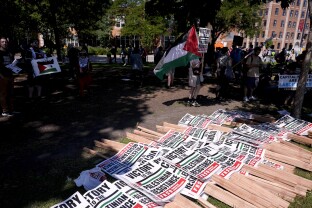CHICAGO — In between the baseball diamonds of Union Park, with just enough clouds overhead to make it a truly beautiful day to celebrate the First Amendment, Cheryl Juris stood alone Monday morning, wrapped in a Palestinian flag.
“I was expecting a lot more people here,” she told NOTUS. Asked if the changing of the top of the Democratic ticket had anything to do with the disappointingly small crowd, she demurred. “It’s Monday, and a lot of people are at work, I guess,” she posited.
This park was meant to be the nerve center of the protest movement that just months ago vowed to be impossible to ignore at the Democrats’ convention. But about 90 minutes before protests were meant to kick off here, Juris was one of a small number of protesters dwarfed by protest marshals ready to hand out water and preprinted signs to surging crowds that had not yet materialized and reportedly never did, at least in the expected numbers.
